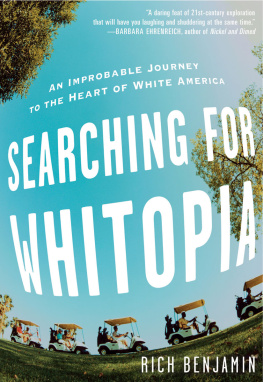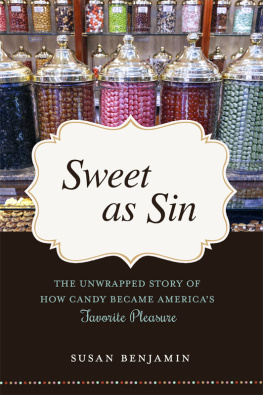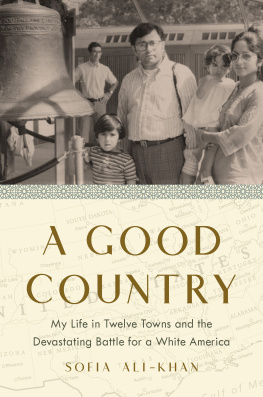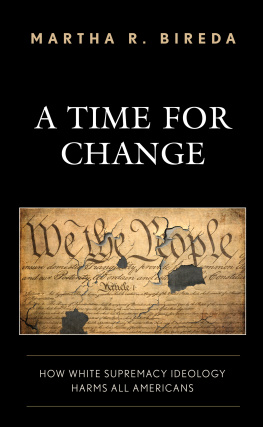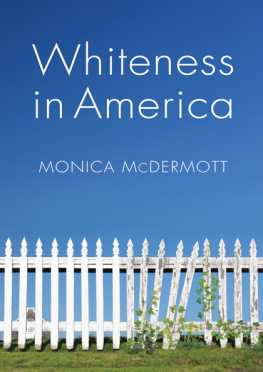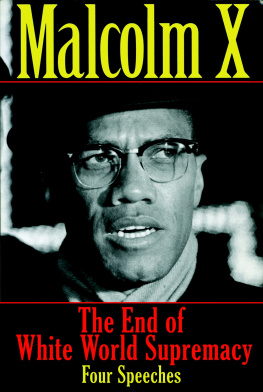I MAGINE MOVING TO A PLACE WHERE YOU CAN LEAVE YOUR front door unlocked as you run your errands, where the community enjoys a winning ratio of playgrounds to potholes, where you can turn your kids loose at 3 P.M. , not to worry, then see them in time for supper, where the neighbors greet those children by name, where your trouble-free high school feels like a de facto private school, where if you decide to play hooky from work, you can drive just twenty minutes and put your sailboat on the water, where the outdoor serenity is shattered only by each seagulls cry, where you can joyride your off-road vehicles (Snowmobiles! ATVs! Mountain bikes! Rock crawlers!) on Natures bold terrain, where your family and abundant friends feel close to the soil, and where suburban blight has yet to spoil your vistas. Just imagine.
If you could move to such a place, would you?
If so, you would join a growing number of white Americans homesteading in a constellation of small towns and so-called exurbs that are extremely white. They are creating communal pods that cannily preserve a white-bread world, a throwback to an imagined past with authentic 1950s values and the nifty suburban amenities available today.
Call these places White Meccas. Or White Wonderlands. Or Caucasian Arcadias. Or Blanched Bunker Communities. Or White Archipelagos. I call them Whitopia.
A prediction that made headlines across the United States ten years ago is fast becoming a reality: By 2042, whites will no longer be the American majority. A related, less-reported trend is that as immigrant populationsoverwhelmingly people of colorincrease in cities and suburbs, more and more whites are living in small cities and exurbs.
So many of the people that are here have come from areas where they have seen diversity done badly, says Carol Sapp, a prominent civic and business leader in St. George, Utah, a bona fide Whitopia.
Christine Blum moved to St. George in 2004 after living for twenty-four years in Los Angeles. When I lived in California, everyone was a liberal, pretty much, recalls Christine, the president of the local womens Republican group. I wanted to be around people who shared my political views. She groans remembering the conversations in California where liberals bashed the GOP and the social settings in which she felt censored. Its like, I dont want to say what I really think, cause theyre going to think Im an evil, right-wing fascist. In California, she worked in the animation field, mostly for Disney, and as an assistant director on King of the Hill. She came to St. George to escape the big city and to start a new career as a cartoonist and illustrator.
Christine says she doesnt miss the many hues in L.A.s population: For me its just the restaurants.
Denise Larsen moved to the St. George area from Milwaukee with her husband and young daughters in 1997. When we heard the gang shootings, we thought Its time to move, Denise tells me over soda pop at Wendys. This kid tried to leave a gang; they shot up his dad down the block from us. I guess you dont try and leave a gang. We could no longer let our kids ride their bikes around. Here, they could ride all the way down to the Virgin River, and we dont have to worry about it. For a mother frustrated with having her daughters bused across town due to a desegregation order, fed up with shoveling snow, and terrified of the gunshots ringing out, her new, Whitopian community is the perfect elixir.
P RESIDENT O BAMAS MOTORCADE winds its way down Pennsylvania Avenue, magnified on the JumboTron like an armored, twenty-foot centipede. The cavalcade delivers our leader to the Capitol this Inauguration Day. I text some friends to come find me where Ive staked a small patch of history among the crowd: base wash. monmt, n.e. side.
The skinny white man to my right shimmies his hips, pumps his flat palms in the air, Ludacris-style. He whoops at the JumboTron, scarfing down a peanut butter sandwich, cloud puffs escaping his chomps into the 19-degree Fahrenheit cold. He offers me a bite. No thanks, I say. He needs the protein more than I.
The Presidents inauguration feels like a rave and a political sacrament, part Lollapalooza, part affair of state. A palimpsest of images, choreographed to awesome effect, flicker across the large screen. Ambling down the Rotunda steps onto the dais are 40 (Carter), 41 (Bush Sr.), 42 (Clinton), and Secretary Clinton. Sasha and Malia, swaddled in bright coats, descend the Capitol stairs, a bit wary. Like an apparition, President Obama suddenly appears. He looks nonchalant but purposeful. As Aretha Franklin takes the stage, her bowtie hat, so big and gracious, winks at me. Will Bush board that hat to fly back to Crawford? I, Barack Hussein Obama, do solemnly swear
After the oath, the masses erupt: more clapping, more dancing, more singing. Gaawwd bless Ah-mericaaah Catharsis, thick as pea soup, envelops the crowdsuch relief, so collective and palpable, that America has turned a corner by inaugurating its first black President. We see ourselves on the JumboTron. We too are the history. Its not just Obama the crowd beams at, but itself.
Not every American or every community, however, is swept by the currents of catharsis or ObamaMania. Obamas presidency has roused pointed disdain across vast swaths of America, expanses whose majority-white locals dismiss the audacity of hope as the banality of hype. Such scorn might confront any Democrat in the White House, but particularly a black one with a Muslim-sounding name, who isnt one of us.
Despite two global wars, a flatlining economy, the most unpopular incumbent President in the history of polling, McCain handily beat Obama among white voters, 55 percent to 43 percent. Many Whitopias voted more Republican in 2008 than in 2004.
Some racial minorities wonder with bated breath: Does a black President mean that whites will turn their backs on racial injustice, conflating the advent of Obama with the end of racism?
Some white Americans wonder with bated breath: Doesnt a black President mean that racial discrimination has been vanquished? Cant minority grievances finally be buried? If not, when? When will white people no longer be made to feel responsible for the sins of our ancestors? When will white females no longer be held to higher admission standards than black males? When will racial minorities scrap race as an excuse for failure? Four years? Eight years? Fifty years? When will racial equality be considered achieved? When? See? Theres a black President.
Having shattered a glass ceiling, Obama personifies a nations giant social strides. But he is no panacea to lingering economic and racial inequality. I have never been so nave as to believe that we can get beyond our racial divisions in a single election cycle, or with a single candidacy, the President said in his infamous race speech in 2008.
That is the dark side taunting the bright side: Despite Obamas historic milestone, America remains a highly segregated society in which whites, Latinos, and blacks inhabit different neighborhoods and attend different schools of vastly different quality.

